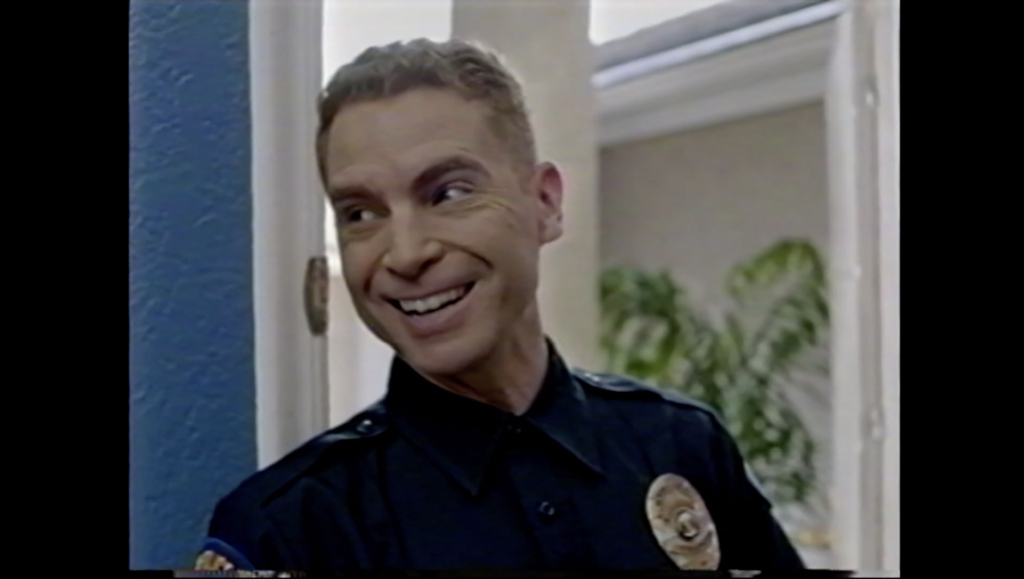Survival Skills doesn’t entirely work, but it’s a bolder film than it initially appears and at least may engender necessary social discourse.
“That uniform doesn’t give you the right to kill whoever you want.” It’s hard to think of a more incendiary line being uttered in any 2020 film than this one from Survival Skills, the feature-length debut from writer-director Quinn Armstrong. What starts as a pitch-black comedy slowly morphs into devastating social commentary, made sharper simply by the moment in history at which it arrives. Armstrong is certainly fully committed to his vision, the tale of a 30-year-old man from Any Town — well, make that Middletown — USA and his first year as an officer on the local police force in the late 1980s. Armstrong presents his film as a police training video, filmed almost entirely on era-appropriate VHS tape, with the expected static and tracking issues that would accompany such a format. (Bonus points to the sound design here, which utilizes the fuzz of said static to create a pulsating atmosphere of menace and dread.)
Jim Williams (Vayu O’Donnell) is a white, Christian man, and he lives his life according to “the rules.” Almost instantly, he is forced to reconsider everything he believes after encountering a mother and daughter involved in a domestic violence case. The more he tries to help, the worse things get — both officers and citizens are affected by a broken system that fails to protect and serve. Jim possesses a certain heartbreaking idealism, the belief that one good man can make a difference, but this is contrasted sharply by Jim’s partner, Allison (Ericka Kreutz), a grizzled veteran who has become disillusioned by the very people she is supposed to defend. After one particularly brutal diatribe, Jim intones to her, “I don’t think you should be a police officer.” Moments like this welcomingly complicate and make more palatable the film’s otherwise questionable message, as does Armstrong’s decision to keep his attention on Jim’s specific course rather than any comprehensive assessment.
An argument could be made that blaming a corrupt system for the actions of one individual is both reductive and ignorant — and rightfully so — but Armstrong has an ace up his sleeve in the film’s final ten minutes, removing a lot of the inherent, palate-deadening bitterness in the process. It’s too bad, then, that he couldn’t get a better handle on the film’s tone, which veers wildly from broad comedy to kitchen sink drama to something akin to a Lynchian affect. That inconsistency extends to the film’s character work: nabbing Stacy Keach to narrate was a particular boon to the production, as his menacing growl adds a level of consistency to the proceedings that most certainly was not present on the page, but it’s tough to tell what the hell is going on with Jim’s wife, a Stepford-esque cipher who seems to be visiting from another planet — and another film — altogether. Even worse, Armstrong’s choice to essentially ignore anything related to race seems like, pardon the pun, a cop-out. Despite these obvious problems, Survival Skills remains a bolder film than it at first appears, and could at the very least provoke a few enlightening conversations at a time when they are deeply needed. That’s worth something, even if it’s not a lot.
Published as part of Before We Vanish | December 2020 — Part 1.
Published as part of Nightstream 2020 — Dispatch 1.
Originally published as part of Fantasia Fest 2020 — Dispatch 4.


Comments are closed.